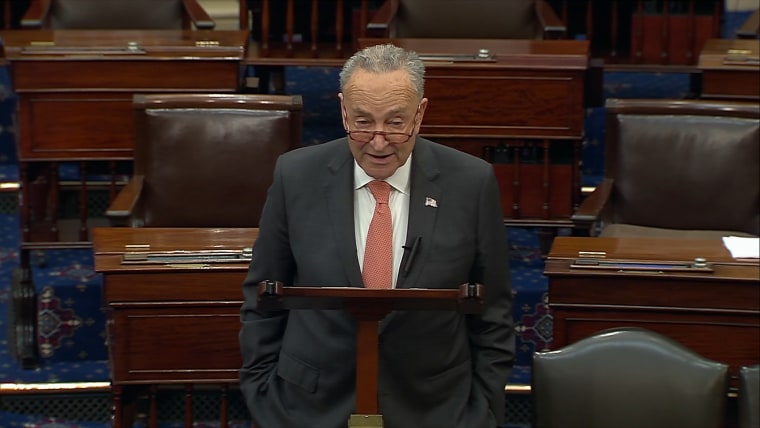An unusual development occurred in Washington on Tuesday, as President Joe Biden signed a bill with solid bipartisan support. What issue convinced dozens of Republicans to join with almost all of their Democratic colleagues in Congress? The need to counter China’s rising capabilities in computer chip manufacturing by pumping money into research and production of computer chips here at home.
The allocation of more than $50 billion in subsidies contained in the CHIPS and Science Act — coming at the same time House Speaker Nancy Pelosi made a controversial trip to Taiwan despite Beijing’s warnings against it — shows there is a will in Washington to scale back interdependence with China.
It is in the United States’ long-term diplomatic and economic interests to pursue greater “waste independence.”
But as the U.S. reconfigures its role in global supply chains such as this one, it is failing to consider a massive, underappreciated and yet enormously consequential global supply chain of another kind: global waste streams.
For too long, the United States has been dependent on other nations, predominantly China and emerging economies across Southeast Asia, to admit, process and manage American waste streams — particularly plastics. This dependence has acted as a crutch for a global waste trade that has reached its limits on a planet that’s warming fast.
It is in the United States’ long-term diplomatic and economic interests to pursue greater “waste independence.” Doing so would build a more efficient, innovative and resilient American economy.
For its sheer quantity, synthetic plastic waste is the biggest waste problem in need of fixing. Since the 1950s, some 10 billion tons of plastic have been produced globally, with over 400 million tons of plastic waste generated each year.
In the postwar era, the world began to consume plastics much quicker than it could manage, eventually resulting in an incredible volume of plastic waste that wound up in the world’s landfills, waterways and oceans. As globalization expanded and new transport technologies enabled much cheaper global shipping, wealthier countries began to solve their growing plastic waste burden through exporting the problem to less developed countries.
Globalization, in other words, facilitated the production of more plastics through making their waste disposal easier. Wealthier countries could take advantage of the global waste system to ship off a growing problem and, in the process, alleviate pressure to change their own behavior.
Partly as a result, the United States generates some 42 million metric tons of plastic waste annually, which translates to a whopping 287 pounds of plastic waste per capita. These figures are far worse than any other country in the world.
In the process, the United States became the world’s leading exporter of plastic waste. Much of it went to China, which over the same period became the world’s leading importer, as it was willing to trade financial compensation for the pollution of its own environment. But as China became wealthier, its acquiescence with this arrangement unsurprisingly diminished. In 2017, the Chinese government imposed strict requirements on waste imports, including for plastics.
China’s sudden restrictions left the U.S. in a bind. Unable to export its waste to China, U.S. domestic waste infrastructure and processing facilities were initially caught unprepared and unable to process mountains of plastic waste. As a result, hundreds of American municipalities shut down their plastic recycling programs, opting to send the waste directly to landfills or incinerators.
At the same time, many exporters increased waste shipments to other countries — predominantly in Southeast Asia — themselves ill-equipped to handle the increased waste volume. Many of these importing countries, in turn, have begun taking steps to reduce or ban plastic waste imports.
This story underscores the risks of failing to appreciate the scale and significance of the plastic waste problem in the U.S., and of failing to act decisively to become independent of the global waste stream. But it is not too late to change course — and the U.S. could reap at least two significant rewards by doing so quickly.
The first reward would be diplomatic. The U.S. is the only OECD country that has not ratified the Basel Convention, which governs the global waste trade. Although there now are significant restrictions on legal plastic waste trade under the convention, including the possibility of criminal trafficking charges if the U.S. ships dirty plastics abroad, America continues doing so anyway.
To prevent becoming a pariah state, the U.S. should flip this script, turning from a laggard into a leader. It should ratify the Basel Convention and head the current global effort to craft a binding plastics treaty, the long-term goal of which would be to end plastic pollution altogether.
The second reward is economic. Waste is a form of inefficiency in that it reflects both wasted material and energy, and therefore lost money, while imposing costs on society and the natural environment.
Shifting to a more efficient footing should generate economic returns outweighing short-term costs through avoiding lost value in the materials (fossil fuels) used to create single-use plastics, reducing harmful impacts to productive natural ecosystems (fisheries, for example) and generating value from new types of plastics with beneficial rather than harmful properties.
Doing so will require shifting our perception of plastic waste from being a problem to an opportunity to innovate, adapt and create new materials, processes and products in pursuit of a circular economy. Government and the private sector will both have roles to play in developing cleaner, greener, tech-oriented solutions.
Right now, the United States has a decidedly unhealthy reliance on other countries’ willingness to accept its garbage.
There are many points of entry to innovate within the plastic life cycle. Consumer products can be designed to minimize the amount of packaging materials, to use alternative materials for improved recycling or biodegradable materials, and to create more durable products for longer lifespans. New bioengineered enzymes can be employed to break down plastics in a matter of days instead of years, in the process transforming plastic polymers from harmful to useful substances.
Whatever techniques are employed, the circular economy should be the goal, with waste viewed as an enemy of a healthy society.
Right now, the United States has a decidedly unhealthy reliance on other countries’ willingness to accept its garbage. Moving aggressively toward domestic solutions will enable the U.S. to generate diplomatic goodwill abroad while building a healthier, greener and more vibrant economy at home. The CHIPS and Science Act shows there is bipartisan will to invest in solutions at home. Taking responsibility for our plastic waste should be next on the action list.
Source: | This article originally belongs to Nbcnews.com











